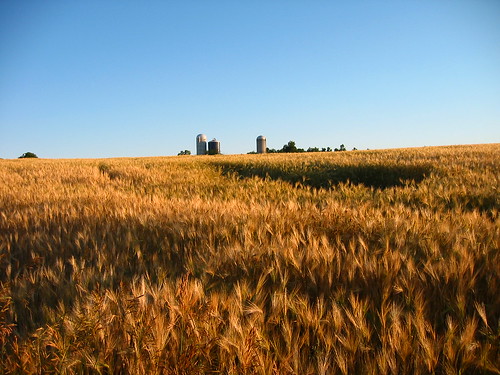The farms race
Posted by Big Gav in agriculture, canada, neocolonialism, saudi arabia
The Globe and Mail reports that wealthy countries like Saudi Arabia that are short of fertile land are "gazing hungrily at Canada's prairies" for offshore farming acreage - The farms race.
The Arab states invest their oil fortunes in the craziest things, from the proposed Mile-High Tower in Jiddah to the indoor ski resort in dry-as-dust Dubai. Perhaps the craziest idea yet is Saudi Arabian wheat. Some 30 years ago, the lake- and river-less kingdom decided it should be self-sufficient in wheat.
It worked. But the subsidies to farmers at times approached $1,000 (U.S.) a tonne. Last year, the Saudis finally concluded that desert wheat made no more sense than Nunavut pineapples. The farms will disappear within a few years, after which the country will be entirely dependent on imports. But from where?
Answer: from any nation willing to sell or lease vast tracts of its farmland and-here's the kicker-allow the Saudis to export most or all of the food grown there back home, bypassing the international market. Such "offshore farms" are a quiet, though burgeoning, form of neo-colonialism. And they have the potential to unleash a new food crisis.
The Saudis are not alone in the global land grab. Any country that worries about long-term food security because of a shortage of fertile land, and has the wealth to do something about it, is on the hunt: United Arab Emirates, Jordan, Libya, India, China, Japan, plus a number of investment and private-equity funds. A report published in the autumn by the United Nations International Fund for Agricultural Development said that "public and private corporations and industrial groups are buying millions of hectares of land in Africa, Asia and Latin America to produce food or agrofuels."
More Report on Business Stories
At first, the UN and the World Bank either ignored or cautiously supported the trend. Food prices were rising and foreign investment in raising crop productivity in poor countries seemed like a fine idea. They changed their minds when they realized offshore farms were all about locking up food supplies, not boosting them for the markets. Bizarrely, one of the countries apparently most eager to welcome farmland seekers is Sudan, where 5.6 million people are being fed by the UN's World Food Program.
Watchdog groups such as Grain and the International Land Coalition also fear that poor farmers are being forced off productive land as the men with the cheques arrive. The authors of a recent Grain report said that some offshore farm deals amount to "the siphoning of fertile and probably contested agricultural lands to rich foreigners."
You can't blame Saudi Arabia and the others for taking care of the nutrition needs of their growing populations, just as the Americans and Europeans will spend fortunes, and sometimes start wars, to lock up oil supplies. In some cases, the land deals might be win-win situations, in that farm jobs are created, crop technology is transferred and some food is left on local tables. But you have to assume altruism is not the priority.
And you can already see how the offshore farmland trend could blow up. The food crisis that triggered riots in Africa and Haiti in 2008 has been tempered by falling commodity prices. It could return in an instant for any number of reasons, ranging from an oil price reversal to a drought. Imagine how suddenly hungry people would react if they knew a good portion of their country's crops were being funnelled to rich countries. Rioters might seize foreign-owned farms. To prevent chaos, the government would probably nationalize the operations.






